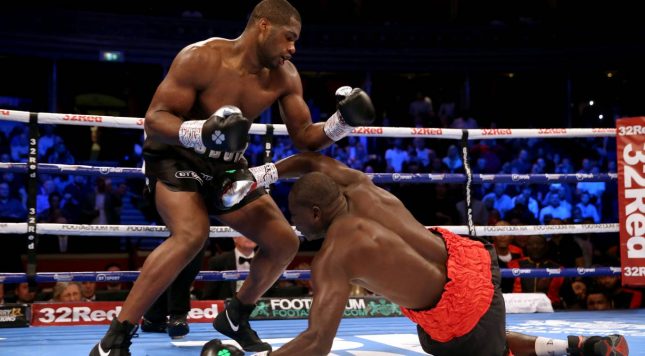It’s hard not to think about Michael Grant.
Two decades ago, Grant was boxing’s latest next big thing. A chiseled, athletic 6-foot-7 250-pounder with an 86-inch reach, Grant was a radioactive-spider-bitten unicorn — a powerful, athletic American heavyweight. Born in Chicago, he would have appeared just as formidable a figure rushing the quarterback off the edge at Soldier Field or taking the ball in the ninth at Wrigley. Grant had, in fact, played some college football and was rumored to possess a fastball that topped out at 90 mph.
None of that mattered for Grant in April 2000, when Lennox Lewis arrived in New York to defend his unified titles and lineal heavyweight championship. For five years leading up to the fight, Grant had laid waste to heavyweights both mediocre and average, and had even dispatched fringe contender Andrew Golota by stoppage. At 31-0, with nearly two dozen thoroughly concussed opponents in his wake, Grant didn’t merely look the part: The Ring had designated him the No. 3 heavyweight in the world, and all measures — dimensions, eye test, resume — suggested he’d earned the recognition.
And then he took an ass-beating.
But sometimes that’s how it goes. Too often, actually. Nothing is so easy as submitting to the siren song of a rising fighter — a heavyweight, no less — who appears for all the world to have the goods. We live in an age of next, which is why we have K-Pop and Ryan Garcia and don’t deserve nice things. Deontay Wilder worked out. Michael Bennett, Audley Harrison, and David Price did not. After the Lewis fight, Grant rebounded, in a manner of speaking: Despite injuries and periodic layoffs, he fashioned a 48-4 record against mostly B- and C-level opposition, before dropping his final three bouts. Grant approached a world title only once more, when, in 2010, he was demonstrably outboxed by Tomasz Adamek in a decision loss.
That isn’t the fate of Daniel Dubois. Or, at least, it doesn’t have to be. Dubois (13-0, 12 KOs) is boxing’s new latest next big thing, and he gave the hopeful (read: Brits) a full metric shit-ton of fodder to revel in Friday night in his hometown of London. Dubois, 22, coming off a noteworthy knockout of fellow undefeated prospect Nathan Gorman in July, was temporarily removed from the deep end to accommodate a glorified exhibition against Ebenezer Tetteh (19-1, 16 KO) at Royal Albert Hall.
Tetteh, 31, hadn’t previously fought outside his native Ghana — and even then, by any definition of the word, just barely: Coming into the Dubois bout, Tetteh had faced opposition featuring a composite 119-185-3 record — including only five fighters with winning records. Seven of his 19 wins had come against opponents making their professional debut or who had yet to win a single fight. Tetteh’s signature triumph to date had been a knockout of Boniface Kabore, whose own shining moment, if memory serves, was a bit part as Rebel 4 in “Blood Diamond.” Against Tetteh, the idea wasn’t so much for Dubois to build on the Gorman win as to get in rounds, stay busy. In retrospect, even that plan was, as the locals in South Kensington are surely fond of saying, as useless as tits on boar.
The particulars of the fight aren’t especially important, but just humor me. From the start, Dubois came forward pumping his piledriver jab, and this unsettled Tetteh immediately. The Ghanian was on the back foot within moments, and Dubois — whose power right hand is nearly as impressive as his left — clearly sensed Tetteh would be no threat in the moments leading up to his eventual starching. It was no longer a matter of if — just when.
That question was answered moments later, after Dubois followed a textbook jab-straight right with another 1-2, a double left hook — one to the gut and one upstairs — and finally a hook back to the midsection and a right cross that leveled Tetteh. Dazed and spooked, the Ghanian rose to his feet to accept the inevitable. Dubois, who hadn’t taken a backward step or so much as raised his gloves in self-defense, unloaded with two hooking fists. After eight unanswered shots, Tetteh dutifully toppled forward to the canvas. He gathered himself again, even more tentatively this time, but at 2:10 of round 1, referee Mark Lyson, with every justification, stepped between Tetteh and his pride.
For Dubois, the win was a drop in the bucket. He’s still more prospect than prizefighter — though he’s a damn good prospect. The plug was pulled on the original plan for Dubois to compete for Great Britain at the 2020 Tokyo Olympics, but his 75 amateur bouts and five national junior titles are a proper foundation. He’s been pushed as a pro, but only just enough. Like Grant before him, Dubois has the size, power, and technique to climb to the highest levels. Unlike Grant, who didn’t box until age 20, the Londoner has been at this since he was a kid.
Until Dubois is in with an opponent who can take a punch and hit back, however, we won’t have so much as an inkling of his ultimate potential. In the short term, there’s talk of throwing him in with Price, himself a former hard-hitting outsize British prospect whose great expectations crumbled with his chin. That isn’t Dubois’ fate. Or, at least, it doesn’t have to be. But sometimes that’s the way it goes.
What’s next? Who the hell knows. Give the kid a minute to figure it out.
(Photo via)

